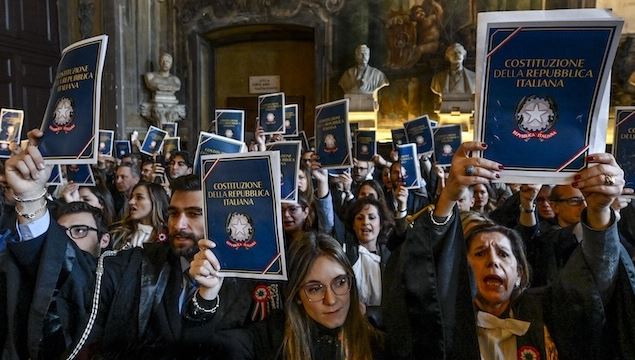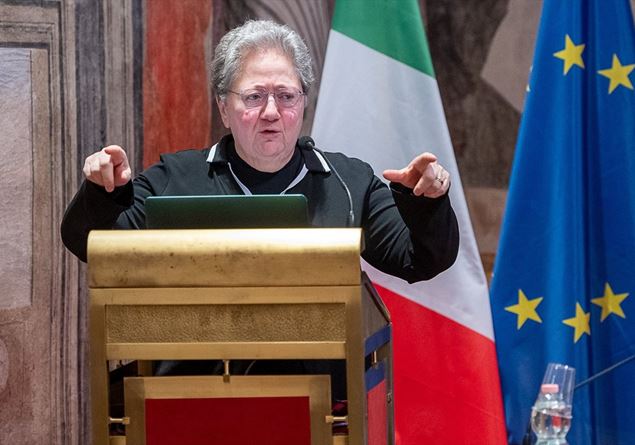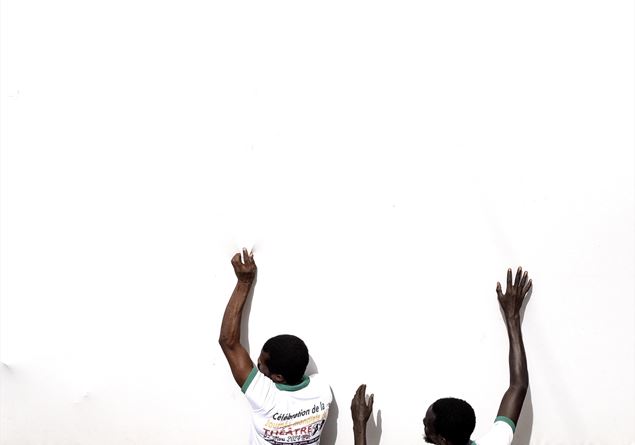«Touching the judicial system means touching one of the three powers of the State, modifying the constitutional structure of the jurisdiction is harmful to the citizens in whose interests we try to obtain attention”. He stated it Paola Cervo, member of the central steering committee of the ANM, outside Castel Capuano, in Naplesawaiting the inauguration of the Judicial Year of the district, where the magistrates protested in silence against the reform under discussion, wearing the black robes of their daily work and carrying the Constitution and a sign with the words of Piero Calamandrei, lawyer , founding father, in 1955 in the Fresco Hall of the Humanitarian Society in Florence on 26 January 1955 on the occasion of the inauguration of a cycle of seven conferences on the Italian Constitution organized by a group of students university and middle school. The objective is to attract the attention of citizens, to make them understand that the separation of careers is not a corporate affair between lawyers and magistrates, between politics and the judiciary, but concerns them as users of the justice system.
«The reform is conveyed with slogans – he added – we limit ourselves to talking about the separation of careers and we look away from the fact that the separation of careers will not solve any of the problems we experience every day in the classroom. We also forget to talk about what will happen to the CSM which is split, we forget to say that politics will assume the power to decide our disciplinary procedures with a frontal breakdown of the separation of powers and that is not what the constituents gave us” .
Following this same logical path starting from Naples where the minister Carlo Nordio spoke in person, to move on to the other 25 Italian districts, the magistrates filed away in silence, when the designated representative of the Ministry of Justice present in the celebrations began to speak of each location. He explains the meaning of the gesture again to Ansa Cervo: «Under the umbrella of the Constitution and with the Constitution in hand today we protest. We leave the room because we have been available for every possible opportunity for discussion, technical discussion and initiative but we have never been listened to for a legitimate political choice which however jeopardizes the constitutional order of the powers of the State”.
Bouncing between the Italian Courts of Appeal, each of which has declined in its own way by joining the protest encouraged by the ANM, Constitution in hand and black robe on the shoulders, what is most noticeable is the disconnect between the reform of the separation of careers, strongly desired by the majority of the Government, which no one, not even those who support it, can improve the effectiveness and efficiency of justiceand the daily difficulties of a cumbersome reality, which suffers as the first president of the Court of Cassation Margherita Cassano already recalled yesterday, the continuous stratification of rules that follow one another without peace and which on the one hand prevent the law from finding certainty and stability, risking presenting it to the citizen as the realm of uncertainty and the possible, on the other they see justice struggling behind the turnover especially in administrative functions, in which hirings are unable to cover retirementsmaking the staffing gap eternal.
From Milan to Naples, to Genoa, we remember the precariousness of the recently established trial office: young people who, once trained, are often attracted to other sectors of the Public Administration which offer, compared to the Ministry of Justice, better salaries and greater stability. In particular, the figure of 72% relating to justices of the peace in the district of Naples stands out in terms of unfilled positions, following a reform which recently entrusted them with jurisdiction for cases up to 50,000 euros. A similar problem creates the shift of competences on migrants from the specialized sections of the courts to the Courts of Appeal already in difficulty with the backlog.
Almost constant, almost everywhere, is the reference to the difficulties generated by the sudden and poorly prepared entry into force of the application for electronic criminal trialsburdened by problems that do not appear to be easily resolved immediately, and which has forced the presidents of the Court in many districts to postpone its entry into force by three months, in the hope that the critical issues, which can remotely impact on procedural rules and send ongoing processes to the air, are smoothed out. The president of the Court of Appeal of Genoa expresses it bluntly Maria Teresa Bonavia: «A faulty and unsuitable IT system has been launched and literally thrown into disarray, against which the criminal trial risks being ruined».
From Milan to Naples the theme of the growth of violent crimes by minors and the dramatic situation of juvenile prisons recursin Campania with overcrowding rates of up to 100%.
Faced with this disconnect, between real problems and a reform perceived as not useful in solving them, the rhetorical question of President of the Court of Appeal of Palermo Matteo Frasca: “It is therefore natural to ask ourselves whether what is really important to everyone is efficient and effective justice in the interests of citizens and not of the contingent and variable political majorities of the moment, administered by a truly independent judiciary”.
It almost echoes him from Milan the president of the Court of Appeal Giuseppe Ondei, who after underlining how the independence and autonomy of the judiciary are “cornerstones” for the maintenance of democracy “from which it is unimaginable to hope precisely for the protection of everyone’s freedom”, adds: “let us hold dear this justice rendered by independent men according to a cognitive path designed by law because the alternatives are dramatically worse”.
And again: «The other side of the independence of the jurisdiction is the impartiality of the magistrate: the latter today is understood in a distorted way as based on the exclusive parameter of approval of the act issued». Instead “it means” that one “must not have any personal interest in the case”. enjoy the trust of the citizens.”
The minister Carlo Nordio in Naples he put aside the aggressive tones of recent days, trying to convince of the intentions to safeguard the independence of the PM at all costs: “Not in my name” he said, speaking in Naples regarding the concern that occurs everywhere that the separation of careers is the antechamber to the subjugation of the PM to the executive: «It will never happen – he reiterated while speaking at the inauguration of the judicial year of the Court of Appeal of Naples – not with this constitutional reform, then the future is in the womb of Jupiter”.
But the aggressive tones used in the Senate in recent days still weigh heavily and are underlined in many Courts of Appeal, among which the appeal of the Attorney General of Bari Leonardo De Castris: «Minister», said the Attorney General of Bari, «you declared on a solemn occasion that some prosecutors would ‘clone the trial files and investigations, to escape the deadline, and would produce hidden investigations’. I represent the top of the prosecuting judiciary in this district: the behaviors that you have represented constitute a crime. If no longer abuse of office, which no longer exists, at least a forgery, because cloning a file is a forgery. If you have facts, I’m here, I will collect them, I will investigate the magistrates disciplinarily, but believe me it is important that a linear indication comes from your seat. You said these things in Parliament and not in a living room. Please send us a signal in this sense.”
It is clear that despite the appeals from many quarters for conciliation, the positions on the issue of separation of careers between the judiciary and the Government could not be further apart.










